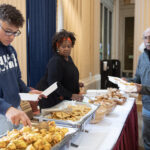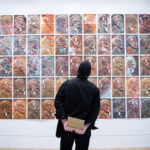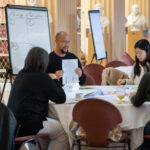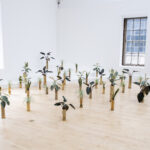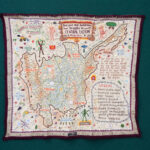Decolonised Transformations Inaugural Event: Recapitulation
Decolonised Transformations Inaugural Event:
Recapitulation
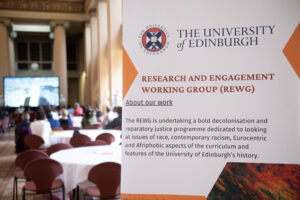
In this issue
- Key notes from the Introductory panel
- Research fellows and Engagement officer
- External Community Representatives
- Thematic takeaways from the roundtable discussions
- More on the inaugural event
- Event slides
- Moving forward
Key Notes from the Introductory Panel
Greetings reader,
On 22 April 2023, the Research and Engagement Working Group (REWG) held an inaugural event to publicly introduce ‘Decolonised Transformations’; a two-year research and engagement project that is looking to investigate and confront the University of Edinburgh’s legacies of enslavement and colonialism.
Our inaugural event was held in the Playfair Library Hall and began with a welcome addressal by the Principal and Vice-Chancellor, Sir Peter Mathieson. Sir Peter Mathieson’s welcome addressal.
This was followed by introductions from members of the REWG who each provided further information regarding their role and expertise within the working group.
Professor Tommy Curry and Dr Nicola Frith, the Co-Chairs of the REWG, began with an introduction to the project and its aims.
Co-Chairs Introduction
Professor Curry defined the meaning of decolonisation as ‘the process by which the oppressed group begins to determine its own destiny and run its own affairs… A genuine decolonisation effort requires breaking the psychological, cultural, political and economic shackles of the old order’ (Staples, 1976: 41).
He reflected on the project’s aims to look at the historical legacies of slavery and colonialism and how these histories have played a role in building these institutions, while considering how these legacies manifest in the recycling of cultural views, practices and systems that reproduce racial discrimination within the institution.
He noted some key elements that differentiate this project and its methodology from other similar university reports. Other projects have hired researchers to investigate an institution’s history of slavery and inform key publics of their findings following a top-down approach. In contrast, one of the aims of the Decolonised Transformations project is to ensure that the racially minoritised communities most affected by the legacies of these histories, as well as other interested publics, do not just receive the findings, but can actively participate in shaping the work and engaging with its outcomes. We therefore aim to see how racial and ethnic groups understand themselves in relation to these legacies and how this may affect their participation in the work of the university. This research will be informed by Critical Race Theory, Black Studies and other relevant methodologies, as well as data analysis that will allow us to create a picture of the trajectory of the institution in terms of the presence and absence of racially minoritised staff and student populations.
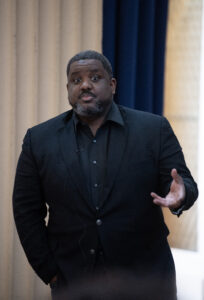
[Professor Tommy Curry addressing participants]
‘The reason this is called Decolonised Transformations is because the report aims to transform the way the institution both locates itself and understands itself within history and tries to move itself into the 21st century by diversification in concrete ways and strategy’ (Professor Tommy Curry, Co-Chair).
Dr Nicola Frith then introduced the four-part structure of the review and noted that its direction and content will be directed, in part, by the discussions held during the launch event to ensure that it includes details requested by the key publics, namely communities of reparatory justice interest (CoRJI), as well as staff and student networks.
Part 1: ‘Why the past matters today’ will outline the contemporary context in which the report is being written by exploring both the work being undertaken at other institutions and the work that has already been done at UoE.
Part 2: ‘The UoE and its links to African enslavement and colonialism’ will provide a historical deep dive into the archives of the institution based on the work of the research fellow Dr Simon Buck and a second fellow who is due to start in September 2023.
Part 3: ‘The current situation of race and racism at the UoE’ will examine attitudes towards race and racism within the institution today and experiences of racism, while also evaluating existing data and data collection processes relating to ethnically minoritised staff and students. This work is being led by research fellow Dr Yarong Xie and research assistant Obasanjo Bolarinwa.
Part 4: ‘An Institutional Vision’ will create a reparatory justice vision for the institution that seeks to address the legacies and contemporary experiences of Afriphobia, anti-Blackness and other forms of racial discrimination. To create this vision, workshops and focus groups will be held with affected communities and other interested parties, who will both reflect on the research and collaborate to form a series of reparatory justice recommendations.
‘A vision for reparatory justice cannot be created or imagined without ensuring that those imaginings and visions come from communities of reparatory justice interests from the very start of the project and throughout its time and beyond’ (Dr Nicola Frith, Co-Chair)
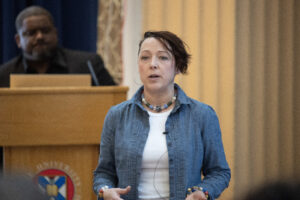
[Dr Nicola Frith addressing attendees]
Research Fellows and Community Engagement Officer Introduction
Dr Simon Buck introduced himself as the research fellow who is looking into the University’s links to the history of African enslavement. He stated the importance of this inaugural event in helping to shape his research journey, before providing some initial details into his current findings.
He pointed to the many ways of understanding how a university is connected to African enslavement. First, there are the financial ties of those whose wealth was entangled in the economies of plantation slavery in the West Indies and North America. This includes those who donated to specific building projects (e.g. Old College) or provided endowments for academic chairs or student bursaries, and identifying those from the University’s administration who were involved in some way in African enslavement, including former Principals and Rectors.
Second, there is the need to understand how the University acted (or did not act) as an institution on matters relating to race, slavery and abolition. How did staff across different disciplines — Law, Divinity, Philosophy, Agriculture, Medicine etc. — help to construct the intellectual infrastructure that made enslavement possible and profitable? Linked to this, what were students studying and what were they debating (through student societies), and what can this tell us about attitudes towards slavery and abolition? This is also about understanding how the University retained a longstanding connection to its alumni, some of whom became enslavers or were connected to enslavement and colonialism.
Dr Buck’s particular research interest is in the Medical School and how the University was a primary location for training those who worked as ships doctors or plantation physicians. This also means looking at how the bodies of enslaved and colonised peoples were used in the classroom (notably in anatomy and in the development of racial pseudo-‘sciences’, such as phrenology); how professors and students wrote papers that drew from, and contributed to, the development of racial ‘sciences’; and how the Medical School’s intellectual networks were closely entangled with forms of colonial power.
‘In all aspects of this work, we are looking to understand more about the lives of the enslaved and colonised people whom the university, directly or indirectly, came into contact with. It is also therefore their stories, their dissent and their humanity that we hope to find within the archives’ (Dr Simon Buck, Research Fellow looking at legacies of enslavement).

[Dr Simon Buck addressing attendees]
Dr Yarong Xie introduced herself as the research fellow investigating the institutional legacies of the University’s links to African enslavement and colonialism. Working with the two Co-Chairs, Professor Tommy Curry and Dr Nicola Frith, and her mentor Professor Nasar Meer, they are implementing two questionnaires to capture the racial climate of the University today.
Dr Xie informed attendees that all members of the University are invited to take part in the first questionnaire, where they will be shown statements and asked to indicate how much they agree or disagree with each statement. People who self-identify as a member of Black, Asian and/or Minority Ethnic communities are invited to take part in a different questionnaire, which aims to measure how often they experience racial discrimination whilst pursuing their degree or career at the University.
Both questionnaires will be distributed online. In-person participation and an alternative format of the questionnaires (i.e. in paper-and-pencil) are available upon request. All responses will be collected and stored anonymously. She noted that we will be gathering some demographic data, such as a participant’s ethnic group, time spent in the University, age group and so on. Participants have the right to withdraw from the study at any point, without needing to give a reason. Their survey data will be erased permanently.
‘We hope students and staff members of the University will help us accomplish this project by taking part in these questionnaires and spreading the word to colleagues and friends’ (Dr Yarong Xie, Research Fellow into racial legacies).

[Dr Yarong Xie addressing attendees]
Samantha Likonde, the Community Engagement Officer, began by detailing her previous work related to race and equality/inequality within the University, as well as her engagement with community-led organisations in Edinburgh and Glasgow. She outlined her experiences to express her understanding and first-hand knowledge of the inequalities and injustices faced by BAME service users, developers and facilitators, as well as the hurdles often involved with engaging in institutional initiatives.
Samantha emphasised the importance of the inaugural event as an example of community engagement, as its purpose was to ensure that the REWG prioritised the attendees’ views, suggestions and concerns in shaping the research and engagement process of the Decolonised Transformations Project. She also invited them to participate in developing the recommendations for the report through follow-up work, such as a series of community engagement initiatives.
Samantha underlined the various ways in which communities and individuals may want to participate in the project at a range of levels: from attending events, co-designing and co-producing materials, to collaborating on events etc., with clear communication between the REWG and participants being maintained through the relevant channels, such as the blogsite and mailing list.
Samantha further spoke about the necessity of the Principles of Participation (PoP), which are used for all engagement activities within the REWG. As a recap, the PoP provide an ethical framework for any activities relating to the project, from surveys through to public-facing events, and any other forms of participation and consultation held within and outside of the University. More information regarding the PoP can be found through the previous blog post: What are Principles of Participation and why do we need them? – Decolonised Transformations
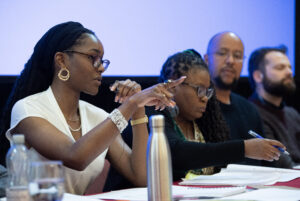
[Samantha Likonde addressing attendees]
External Community Representatives
The final speakers from the REWG were two external community representatives — Zaki El-Salahi and Esther Stanford-Xosei — who are helping to shape and drive our engagement and reparatory justice processes.
Zaki El-salahi is a community education professional and a lead volunteer on Edinburgh’s Sudanese community partnership. He detailed how his roles within community works have provided him with skills relating to participation, human rights and safeguarding, as well as exploring how his training within the University of Edinburgh has allowed him to navigate the halls and walls of such institutions.
Zaki stated that part of his aim, as a member of the REWG, was to discuss the conditions of the Black community within Edinburgh. He wants to highlight how many Black people are actively part of the University estate and how they have often been disempowered by the University.
Zaki described the important and necessary role of communities, particularly the Black community, African Diaspora and working-class communities, as external drivers alongside the University to ensure that justice is done to the work. The project should not be thought of as a historical or academic exercise, but rather as something of importance right now in describing the lives of Black and working-class people in the city of Edinburgh and across the world.
Zaki exemplified this by referring to the current violence in Sudan and how it reflects on historical colonial events that are also linked with the University of Edinburgh, notably the theft of the heads of the Sudanese Shaheed warriors (currently held within the Anatomical Museum) following the Battle of Omdurman (1898) in which the British Army sought to reconquer and colonise Sudan.
‘The role of the communities is to be the external driver, the reminder and the holder of the mirror, which reminds us that this is a local and global exercise. It cannot remain only within the academy’ (Zaki El-Salahi, community member).
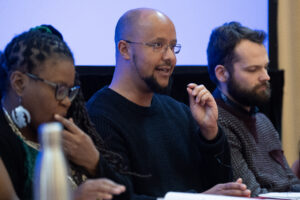
[Zaki El-Salahi addressing attendees]
Esther noted that affected communities and the descendants of those who were enslaved and colonised have a right to participate in the decision–making around the transformation of the University of Edinburgh. She highlighted the importance of the Principles of Participation (PoP) in governing this process, particularly Principle 1: A commitment to recognising historical and contemporary struggles for social and reparatory justice; and Principle 2: A commitment to mutual benefit, strengthening partnerships and restoring agency through participation. The PoP are key to guard against the fact that many other institutions, in doing this kind of work, have excluded the voices and approaches of the descendants of colonised and enslaved peoples who are alive today and may study, work or engage with the University.
‘If we are to be true to the principles of reparatory justice, this includes the recovery of affected communities, restoration of dignity and agency, and recognition that we exist, we matter and we have a stake’ (Esther Stanford-Xosei, community member).
Esther highlighted an example of international good practice in referencing the legislation passed in Virginia in 2021: ‘The Enslaved Ancestors College Access Scholarship and Memorial Program’. This impacts five universities in Virginia with a programme to provide tangible benefits, such as scholarships and economic development programmes, to local communities and descendants as a way of breaking the cycle of both racism and inter-generational impoverishment. It includes a number of recommendations and guidelines around principles of engagement with communities and various stakeholders in a way that can actually bring to life the principles of reparatory justice. Esther provided this as just one example among many others to create a basic minimum and legal standards around participation rights for affected communities.
‘Whatever we are doing here does not exist in a vacuum. This has to be seen as part of a wider effort not only locally and national, and across the UK, but also internationally to actually affect and secure holistic repair’ (Esther Stanford-Xosei, community member).
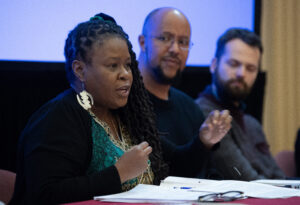
[Esther Stanford Xosei addressing attendees]
Finally, the welcome panel introduced Claire Walsh, Art Collection Curator for the UoE, who provided important context to the material heritage of the University, particularly the artwork within the Playfair Library, by discussing the contentious nature of the space through a critical lens.
On discussing the portraiture within the Playfair Library Hall, Walsh informed attendees that the white marble busts within the hall are part of the University’s art collection, which comprises 8000 artworks, the oldest dating from the first century BCE. All the white marble busts depict white British men connected to the university in the 18th and 19th centuries, this style of commemorative portraiture being very popular at the time. She noted the way that it fits into the architecture of the building, which is in the Greek revivalist style designed to showcase the University as a centre of Enlightenment thinking, power and knowledge.
Walsh highlighted two busts which are linked to the legacies of slavery and colonialism at the University: the busts of Principals Sir William Muir and Sir Alexander Grant.
Muir played a significant role as a colonial administrator in the East India Company. He was also a scholar of Arabic and the History of Islam, and wrote publications on the history of Islam, such as his original book, A life of Mahomet and a History of Islam to the Era of the Hegira (1857), which received critical feedback due to its negative views of Islam.
Sir Alexander Brant was another operative in British India. He was Vice Chancellor and Principal at the University of Bombay and a member of the legislative council. The University College London database on the Legacies of British Slavery reveals the long line of his family connections to enslavement. For example, his father, Robert Brant, was awarded compensation for enslaved peoples in estates in British Guyana and Jamaica.
While this was only brief overview of the material culture at the UoE, it pointed to the presence of these imperial figures within the University and the way that artworks fail to be representative of the overall population of the University.
‘The marble busts in the Playfair Library raise questions about what values are being reflected by these figures and who is not represented’ (Claire Walsh, Art Collection Curator).

[Claire Walsh addressing attendees]

[Marble bust within Playfair Library Hall]
Thematic takeaways from the roundtable discussions
Thank you to all those who attended and participated in the inaugural event. The discussions that took place at each roundtable were crucial in helping the REWG understand the unique experiences, viewpoints and aspirations of the diverse communities present, and in shaping the work of the Decolonised Transformations Project going forwards. Please visit the following link to read the keynotes taken from the six roundtable discussions.
From these discussions, the REWG is working on the development of four themes that will serve as the framework for our concentrated work with communities of reparatory justice interests from September 2023 to May 2024.
These include:
Theme 1: Restitution and the anatomical museum.
Theme 2: Cultural space for communities (linked to a research centre).
Theme 3: Digital archiving and reparatory justice.
Theme 4: Decolonising and transforming the curriculum.
More on the inaugural event.
The inaugural event was filled with a sense of positivity, curiosity and excitement, thanks to the open and honest communication from all attendees, which was a common comment from the feedback collected from the event. It was evident that everyone present shared a mutual aim of bringing about meaningful change within the University space.
One aspect that significantly contributed to the positive ambiance was the presence of cultural food. Whilst organizing the event, the REWG made a conscious effort to incorporate catering from two independent African restaurants based in Edinburgh: Uwagboes Kitchen and Grill, and Knight’s Kitchen. This detail was essential to firstly to reflect the diverse backgrounds represented within the University community and to reinstate the importance of inclusivity in our pursuit for progress within the UoE, specifically as outside catering is not usually permitted within the Playfair Library Hall or many locations on campus. This simple step of inclusivity and care is one example of how the University can begin to better engage with its diverse student, staff and community members.
Thank you to John Uwagboe, Christine Longstaff and both of their teams for their great work in catering and delivering to our event. Both companies provided excellent meals, and service which were greatly enjoyed by the attendees.
Another highlight of the event was the intermission dedicated to an art exhibition that resonated deeply with the themes of colonisation and capitalism. The Accursed share held within the Talbot Rice gallery displayed artworks that explored the complexities of the subject of colonisation, evictions, enslavement, exploitation of resources and militarisation, shedding light on marginalised perspectives. The thought-provoking pieces sparked conversations and reflections among attendees, encouraging a critical examination about the need to address systemic injustices and inequalities within the university and beyond. This creative expression acted as a powerful medium to raise awareness and promote dialogue around the issues at hand.
Thank you to James Clegg, the exhibition curator at the Talbot Rice Gallery, for working closely with the REWG in bringing the art exhibition visit to life. This was an inspiring and thought-provoking experience that will leave a lasting impact on all who have had the pleasure of attending.
A final thanks to the brilliant students notetakers on the day: Deborah Alhassan, Asheema Kour, Amah Husein and Paul Agege for their great work and attention to detail in scribing the discussions that took place.
- Sir Peter Mathieson’s welcome addressal
- Knights Kitchen Caterers
- Uwagboe’s Kitchen and Grill Caterers
- Moyra Davey, ‘Copperheads No. 401-407, Janis J. Portikus,’ 1990-2017.
- Playfair Library Hall
- Zaki El-Salahi’s Roundtable on the Principles of Participation
- Velma McClymont promoting her latest publication ‘Little River’
- Sammy Baloji, ‘Untitled’, 2018-2023. Installation view. ‘The Accursed Share’ 2023.
- Cian Dayrit, ‘Valley of Dispossession’, 2021.
- Shadowed Marble Bust
- Goldin+Senneby, ‘The Plot (Utopia Bloemen)’, 2018. Installation view
- Attendees gathered in the Playfair Library Hall
- Attendees participating at the roundtable on Community Engagement
Moving forward.
Thank you, reader, for taking your time in reading about the Decolonised Transformations Inauguration we hope this recapitulation has provided you with an insight into the aims of the project, the members of the working group and the collective and genuine move towards change that we aim to lobby the University to undertake. This is only the first step. Further information regarding projects and opportunities for engagement will be featured on the page soon.



